Related Research Articles
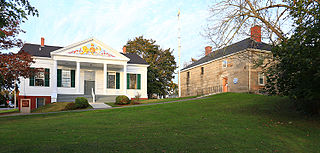
Charlotte County is the southwest-most county of New Brunswick, Canada.
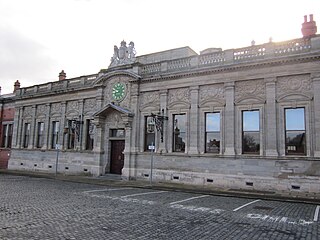
Lever Brothers was a British manufacturing company founded in 1885 by two brothers: William Hesketh Lever, 1st Viscount Leverhulme (1851–1925), and James Darcy Lever (1854–1916). They invested in and successfully promoted a new soap-making process invented by chemist William Hough Watson. Lever Brothers entered the United States market in 1895 and acquired Mac Fisheries, owner of T. Wall & Sons, in 1925. Lever Brothers was one of several British companies that took an interest in the welfare of its British employees. Its brands included "Lifebuoy", "Lux" and "Vim". Lever Brothers merged with Margarine Unie to form Unilever in 1929.

St. Stephen is a Canadian town in Charlotte County, New Brunswick, situated on the east bank of the St. Croix River around the intersection of New Brunswick Route 170 and the southern terminus of New Brunswick Route 3. The St. Croix River marks a section of the Canada–United States border, forming a natural border between Calais, Maine and St. Stephen. U.S. Route 1 parallels the St. Croix river for a few miles, and is accessed from St. Stephen by three cross-border bridges.

The St. Croix River is a river in northeastern North America, 71 miles (114 km) in length, that forms part of the Canada–United States border between Maine (U.S.) and New Brunswick (Canada). The river rises in the Chiputneticook Lakes and flows south and southeast, between Calais and St. Stephen. It discharges into Passamaquoddy Bay, in the Bay of Fundy.
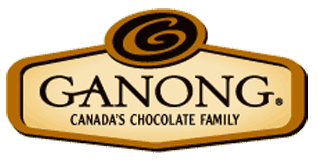
Ganong Bros., Limited is Canada's oldest candy company. It was founded by James and Gilbert Ganong in 1873 in St. Stephen, New Brunswick, where it remains. Primarily a producer of boxed chocolates and the first to introduce heart-shaped boxes, it now provides many chocolates for Laura Secord stores.
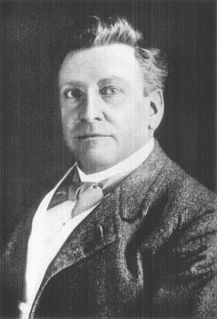
William Hesketh Lever, 1st Viscount Leverhulme, was an English industrialist, philanthropist, and politician. Having been educated at a small private school until the age of nine, then at church schools until he was fifteen; a somewhat privileged education for that time, he started work at his father's wholesale grocery business in Bolton. Following an apprenticeship and a series of appointments in the family business, which he successfully expanded, he began manufacturing Sunlight Soap, building a substantial business empire with many well-known brands such as Lux and Lifebuoy. In 1886, together with his brother, James, he established Lever Brothers, which was one of the first companies to manufacture soap from vegetable oils, and which is now part of the British multinational Unilever. In politics, Lever briefly sat as a Liberal MP for Wirral and later, as Lord Leverhulme, in the House of Lords as a Peer. He was an advocate for expansion of the British Empire, particularly in Africa and Asia, which supplied palm oil, a key ingredient in Lever's product line. His firm had become associated with forced labour and atrocities in the Belgian Congo by 1911.
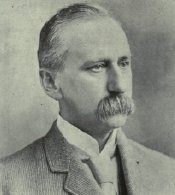
Gilbert White Ganong was a Canadian politician, the 14th Lieutenant Governor of New Brunswick and co-founder of Ganong Bros. Limited, candy makers in the town of St. Stephen.

William Francis Ganong, M.A., Ph.D., LL.D., F.R.S.C., was a Canadian biologist botanist, historian and cartographer. His botany career was spent mainly as a professor at Smith College in Northampton, Massachusetts. In his private life he contributed to the historical and geographical understanding of his native New Brunswick.

Alexander "Boss" Gibson was a Canadian industrialist in New Brunswick, Canada. His business interests included sawmills, railways, and a cotton mill. He founded the company town of Marysville, New Brunswick.

Arthur Deinstadt Ganong was a Canadian businessman and politician. He was born in St. Stephen, New Brunswick into a chocolate making family and would serve as president of Ganong Bros. Limited from 1917 to 1957. He was known for eating several pounds of chocolate a day.
St. Stephen Rural Cemetery is a municipal cemetery established in April 1856 at the town of St. Stephen, New Brunswick, Canada. The cemetery encompasses 65 acres (260,000 m2) of land with approximately 12,000 burials. There are over 20 kilometres of avenues and paths.
Major-General Hardy Nelson Ganong CBE, VD, ED was a Canadian sportsman and a military commander who served in both World War I and II.
Susan Brittain Ganong B.Sc., LLD was a widely respected Canadian educator and proprietor of the Netherwood School for girls in the Province of New Brunswick.

James Harvey Ganong was a Canadian businessman in St. Stephen, New Brunswick who co-founded Ganong Bros. chocolate making company in 1873 and the St. Croix Soap Manufacturing Co. in 1878.

James Edwin Ganong was a Canadian businessman. Known as Edwin, he was born in Boston, Massachusetts where his Canadian parents had relatives. The son of James H. Ganong and Susan E. Brittain, he is the brother of Susie, Kit (Whidden), Arthur, and William.
Rendol Whidden Ganong, was a Canadian businessman from the Province of New Brunswick. Known as Whidden, he was born in the border town of St. Stephen, the eldest son of Berla Frances Whidden and Arthur D. Ganong.
David A. Ganong, is a Canadian business executive.

Fairbank's Gold Dust washing products was a line of all-purpose cleaning agents researched and developed by the N. K. Fairbank Manufacturing Company. First introduced to the American consumer in 1889, Gold Dust Washing Powder became a success due in large part to its low selling price and bright, eye-catching packaging. The most easily recognized members of the soap line were Gold Dust Washing Powder and Gold Dust Scouring Soap. They were marketed in boxes and containers prominently featuring the brand's well known trademark, the Gold Dust Twins. "Let the Twins Do Your Work" was the product's long lasting and ubiquitous slogan.
W. H. Burford and Sons was a soap and candle-making business founded in Adelaide in 1840 by William Henville Burford (1807–1895), an English butcher who arrived in the new colony in 1838. It was one of the earliest soapmakers in Australia, and up to the 1960s when it closed, the oldest. In 1878 he took his two sons Benjamin and William into partnership as W. H. Burford & Sons. Its expansion, accompanied by a number of takeovers, made it the dominant soap manufacturer in South Australia and Western Australia. Its founders were noted public figures in the young city of Adelaide.

Saint James is a civil parish in Charlotte County, New Brunswick, Canada, located north of St. Stephen. It comprises one local service district (LSD) and part of a second, both of which are members of the Southwest New Brunswick Service Commission (SNBSC).
References
- Folster, David. The Chocolate Ganongs of St. Stephen, New Brunswick (1991) Goose Lane Editions ISBN 0-86492-115-2
- Craigs, Melodie. Ganong, The Candy Family (1984) Literacy Council of Fredericton ISBN 0-920333-16-8